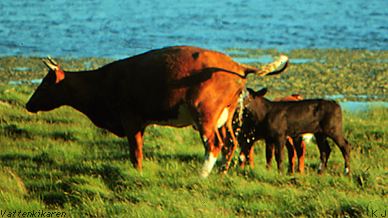 |
|

| Grazing stock help to keep the landscape open and
promote bird life. Because the soil is covered by grass, nutrients
are constantly taken up and finally consumed by grazing stock so
that the burden on the sea is less. |
The animal production of urea and urine
is between twice and ten times that of the human production and for every
year that passes it becames more and more difficult finding arable land
to spread it on. Plants can only utilize a certain amount of these nutrients
and if a surplus occurs it will dissappear up
into the atmosphere as ammonia or leak out into the rivers in the form of
nitrates - and eventually out to the sea.
To increase agricultural production, arable land is often
enriched with artificial fertilizers. Fertilizers usually contain different
forms of ions of nitrogen
(N), phosphorous (P) and potassium (K). (Compare with the ingredients in
a packet of flower fertilizer.) If agriculturalists use excessive amounts
of fertilizer, environmental problems can arise. Nitrogen is washed out
of the soil relatively quickly and eventually ends up in the ground water
or rivers. Phosphorous is not washed out as quickly as it has a tendency
to bind itself to the sediments in the soil, but some of it is washed out
and eventually ends up in the sea.
In todays modern farming, farmers often specialize to one
major crop. This usually results in large areas lying fallow during the
winter without any crops taking up the nutrients from the soil. Nitrogen
simply leaks
out.
 |
Page
12 of 28 |
 |
|



